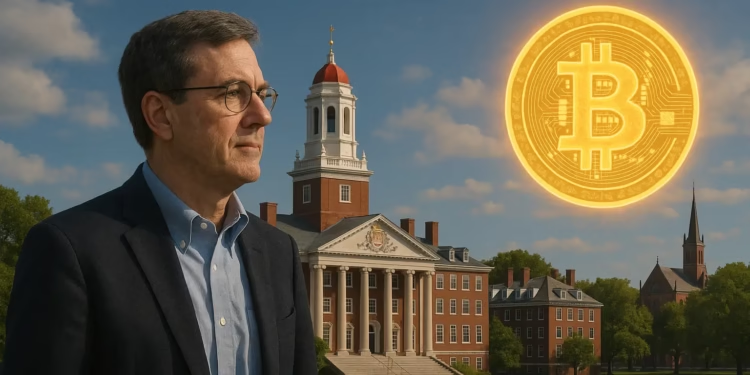Harvard University has made a landmark $116.7 million investment in BlackRock’s iShares Bitcoin Trust (IBIT), marking one of the most significant Harvard Bitcoin ETF positions by any academic institution
According to a Friday filing with the U.S. Securities and Exchange Commission (SEC).
The investment, representing roughly 1.9 million shares as of June 30, 2025, makes IBIT Harvard’s fifth-largest equity holding ahead of its stake in the SPDR Gold Trust.
The purchase was made through Harvard Management Company (HMC), which oversees the university’s $53.2 billion endowment, the largest among U.S. universities. SEC data shows Harvard is now the 29th-largest institutional holder of IBIT among roughly 1,300 investors.
“This is a clear signal that Bitcoin is no longer viewed solely as a speculative asset by elite institutions,” — Rachel Kim, Senior Analyst at Digital Asset Research Partners.
Universities warm to regulated crypto exposure
Harvard’s entry into the Harvard Bitcoin ETF market follows a broader trend of U.S. universities moving into regulated crypto products. Brown University disclosed a $13 million IBIT position during the same reporting period, while Emory University made a 2024 purchase of 2.7 million Grayscale Bitcoin Mini Trust shares worth over $15 million.
For years, endowments avoided direct cryptocurrency exposure due to volatility, custody risks, and compliance hurdles. However, SEC-approved spot Bitcoin ETFs, launched in January 2024, have changed the landscape by offering professionally managed, exchange-traded exposure to Bitcoin.
“The ETF structure removes much of the operational burden of holding Bitcoin directly, while still allowing institutions to benefit from price movements,” — Thomas Blake, Portfolio Strategist at State Street.
IBIT’s growth underscores that appeal: since launch, it has accumulated over $86 billion in net assets, representing roughly 738,000 bitcoins about 3.5% of total supply. Institutional investors such as hedge funds, pension plans, and now universities are increasingly using IBIT to integrate Bitcoin into diversified portfolios without the need for direct custody.
Market timing and strategic implications
The timing of the Harvard Bitcoin ETF purchase aligns with Bitcoin’s strong performance in early 2025, fueled by significant institutional inflows. BlackRock’s IBIT has emerged as one of Wall Street’s most closely tracked ETFs, with trading algorithms monitoring its flows alongside blue-chip equity benchmarks.
The decision to allocate such a large share of its endowment to IBIT also places Harvard ahead of many peer institutions in crypto adoption. While Microsoft, Amazon, Booking Holdings, and Meta remain Harvard’s top equity positions, IBIT’s inclusion in this group indicates Bitcoin’s transition into mainstream institutional investing.
“This is no longer just about diversification — it’s about positioning for future market structures in which digital assets play a central role,” — Kim added.
Regulatory shifts enhance ETF appeal
Regulatory developments have added further momentum to the Harvard Bitcoin ETF narrative. Earlier this week, the SEC approved an increase to 25,000 options contracts per ETF, enabling more sophisticated trading and hedging strategies favored by institutional investors.
Analysts believe this change could deepen liquidity in spot Bitcoin ETFs and attract even more endowment and pension fund participation. For Harvard, which has steadily increased its IBIT allocation year over year, the new options capacity offers additional flexibility in managing risk.
Industry observers note that as the Harvard Bitcoin ETF holding grows, it could influence other large, compliance-focused institutions to follow suit. Precious-metal ETFs, once a common safe haven for endowments, are already being overtaken by Bitcoin ETFs in certain allocation models
From fringe asset to portfolio mainstay
The Harvard Bitcoin ETF stake highlights Bitcoin’s rapid evolution from a speculative experiment to an accepted component of institutional portfolios. The move also suggests that some of the world’s most conservative investors now see Bitcoin as a legitimate store of value and potential growth driver.
Harvard’s investment joins a growing list of high-profile endorsements that could accelerate mainstream acceptance. For crypto investors, the message is clear: Digital assets are gaining a foothold not just in retail portfolios, but in the largest and most strategically managed funds in the world.
If current trends continue, the Harvard Bitcoin ETF allocation may be remembered not as a bold gamble, but as a calculated early move in the broader integration of Bitcoin into global finance.











